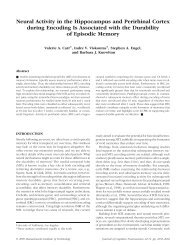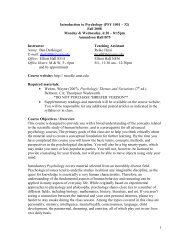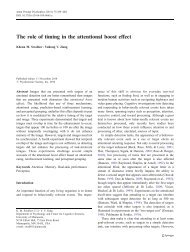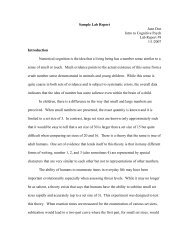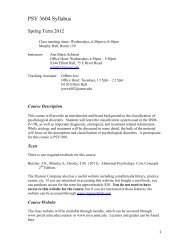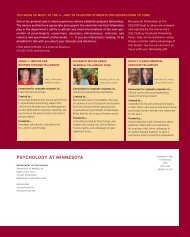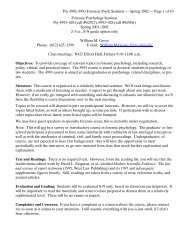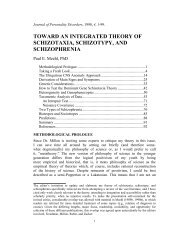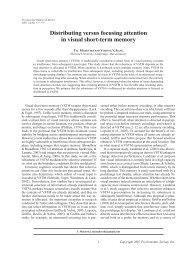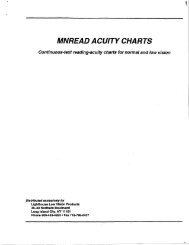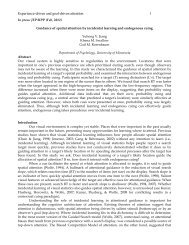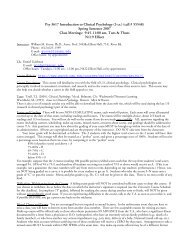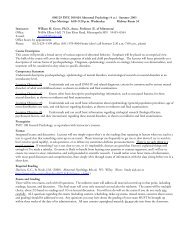PSY 3051: Introduction to Cognitive Psychology - University of ...
PSY 3051: Introduction to Cognitive Psychology - University of ...
PSY 3051: Introduction to Cognitive Psychology - University of ...
Create successful ePaper yourself
Turn your PDF publications into a flip-book with our unique Google optimized e-Paper software.
12/6 Tu Q20 Language 2: Language & the brain Hickok (02): Sign language inbrain. Reisberg Chapter 10.12/8 Th Q21 Language 3: Language & thought Dehaene (06): Core knowledge <strong>of</strong>geometry in an Amazonian group12/13 Tu Q22 Finale: Consciousness & Wrap-up Tong et al. (1998). Binocularrivalry & visual awareness.Reisberg Chapter 15.12/22 Final Exam (in our classroom) 8-10am. A Q&Areview section will be arranged.Have a good winter break!Policies1. Make-up exam policyThere are no makeup exams. In case <strong>of</strong> signed verification from the dean’s <strong>of</strong>fice withlegitimate excuse for a missed exam, see Instruc<strong>to</strong>r.2. Score dispute policyDispute about grading on an exam or lab report should be brought <strong>to</strong> Pr<strong>of</strong>. Jiang, rather than <strong>to</strong>any <strong>of</strong> the TAs. Your entire exam or lab report will be re-graded, including parts where you donot have disputes. The corrected score could be lower than the original you received, becauseyou may lose points on some questions that gain points on others.3. Materials responsibleLecture materials, plus readings that overlap with lecture materials. Exams questions are drawnfrom lecture materials.4. Lab report gradingEach lab report will be graded on a 10-point scale. Lab report turned in after the deadline, evenif passed, will not receive the maximum. Each late day means 1-point lower in the maximum.Each exceptionally good lab report may earn a bonus <strong>of</strong> 1-point.5. Communication policyStudents are encouraged <strong>to</strong> discuss among themselves the results and interpretation <strong>of</strong> labresults during the in-class lab. However, once the class is dismissed, students should NOTdiscuss lab reports with other students. Each person must independently work on the labreports. You can consult with the TAs or the instruc<strong>to</strong>r, but not with other students. Do notcopy or paraphrase other students’ lab reports.6. AttendanceAttendance on the first day <strong>of</strong> class and on each <strong>of</strong> the three labs is manda<strong>to</strong>ry. Those who donot show up on the first day <strong>of</strong> class may forfeit their seat <strong>to</strong> other students waiting <strong>to</strong> registerfor the class. In-class quizzes will be given on days when attendance is not taken. Exams willbe based on lecture materials. In previous years, students who missed lectures tended <strong>to</strong> dopoorly on exams.7. Grades *Final exam: 36%; midterm 1: 16%; midterm 2: 16%; three lab reports: 12% (each 4%); Quizand attendance: 20%.Fall 2011 <strong>PSY</strong> <strong>3051</strong> at umn.edu4Intro <strong>to</strong> <strong>Cognitive</strong> <strong>Psychology</strong>



